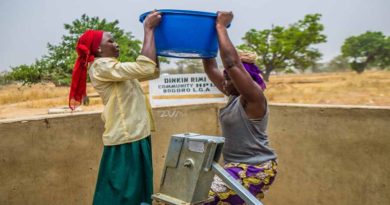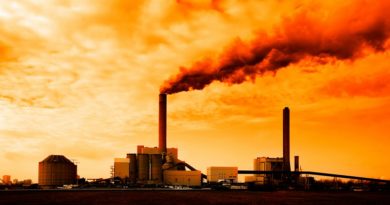We need real and transformative climate action now- Climate Champion
Inia Seruiratu is Fiji’s Minister for Agriculture, Rural and Maritime Development, National Disaster Management and Meteorological Services. As one of two High-level Climate Champions under UN Climate Change, he is responsible for guiding the Marrakech Partnership for Global Climate Action, launched in 2016 to increase climate action by Parties and non-Party stakeholders, including the private sector, in the critical period to 2020. UN Climate Change News spoke with the Climate Champion:
What is the role of the Marrakech Partnership with respect to the Paris Climate Change Agreement, and what is your vision for the Partnership?
We need real and transformative climate action on the ground, now. Parties to the Paris Agreement recognized explicitly that action by national governments alone would be insufficient to limit temperature rise to 1.5 degrees Celsius and avoid the worst effects of climate change. We need concerted action from all levels of government, the private sector, and civil society.
The Marrakech Partnership works to catalyze, recognize and support this concerted action in line with countries’ Nationally Determined Contributions under the Paris Agreement. Another key role of the Partnership is to feed experiences and lessons from action on the ground into the formal UN Climate Change process and to the Parties, and this year, this will be through an important process called the Talanoa Dialogue.
The Partnership is a platform where like-minded stakeholders, who are actively undertaking climate initiatives and innovations, can share experiences, work together, and multiply their efforts. I see the Partnership drawing more and more stakeholders into this climate action movement. We need this movement to sweep across our nations, our regions, and across the globe – and we need to have this movement formally recognized by Parties and to strengthen engagement between Parties and non-Party stakeholders. That is my vision and what is required for success achieving the goals of the Paris Agreement.
What progress has been made so far by the Marrakech Partnership?
The Marrakech Partnership was launched to give impetus and structure to climate action taking place globally. Just in the past year, the number of stakeholders operating under the Partnership has jumped. Seventy percent of these have taken on new commitments. It’s a sign that people want to work together and they are striving for greater ambition.
At the UN Climate Change Conference COP23 in Bonn last November, we held more than 100 events under the banner Global Climate Action – including high-level events – covering land use, oceans and coastal zones, water, human settlements, transport, energy, and industry, together with cross-cutting issues, such as finance, health, resilience, and education.
We also released the Yearbook of Global Climate Action 2017 during COP23, which shines a light on all the great work that is being accomplished under the Partnership. In October of last year, we published a Summary for Policymakers to complement the Yearbook. It provided recommendations emanating from the UN Climate Change technical examination process for consideration by ministers, particularly regarding collaborative initiatives and opportunities for adaptation, mitigation in the urban environment and in the agriculture, forestry and other land use sector.
Much has been done since we started this journey; but, much more needs to be accomplished, especially in the next two years.
What are the key priorities for the Marrakech Partnership in 2018?
Global carbon emissions are still rising. It is absolutely essential that within the next two years we begin to bend the emissions curve downward if we are to avoid the worst effects of climate change. It’s imperative that climate action is accelerated.
During Climate Week in New York City in September, we took an important step forward with the launch of the Leadership Network for Climate Action. Through this network, we will bring together leaders from around the world to support us, the Climate Champions, and the Marrakech Partnership, to encourage governments to raise the ambition of their national pledges to reduce emissions before 2020. This makes 2018 a critical year.
Furthermore, 2018 is the year of the Talanoa Dialogue, where we will be taking stock of the collective efforts of Parties towards achieving the goals of the Paris Agreement. Talanoa is a traditional Fijian and Pacific concept, which entails sharing stories, forging relationships, and building empathy in order to make sound decisions for the collective good. The Talanoa Dialogue invites both Parties and non-Party Stakeholders to be engaged in the process. We want to hear the stories, the experiences, and lessons from non-Party stakeholders – especially from the private sector and from various initiatives, alliances, and coalitions – so that their voices can support and guide the Talanoa Dialogue this year.
This is something that has already started. Many non-Party stakeholders were already reporting their progress on a variety of platforms, including on the NAZCA portal – the Non-State Actor Zone for Climate Action. In 2018, evolution of the NAZCA portal is a priority. It should be a highly informative yet easy-to-use platform to track progress and impact and draw insight.
What role can the Asia-Pacific region play in the Marrakech Partnership?
If you look at the Yearbook I mentioned earlier, you’ll clearly see that global climate action is spreading, especially to the global South.
One of our priorities this year is to ramp up action in Asia-Pacific. There is so much to share with and from this region. The Asia-Pacific region is vast, covering varied geographical areas and with countries at different levels of development; therefore, there is a rich diversity of scenarios in the region for different approaches and the sharing of different and common lessons and challenges for accelerating climate action.
Finance is a huge overriding priority. The volume of climate finance delivered by non-Party stakeholders has certainly been rising. It was reported in 2014 by the [UNFCCC] Standing Committee on Finance that total global climate finance – which includes considerable investment by the private sector, as well as national and subnational governments worldwide – reached approximately USD 741 billion. This is an increase of about 15 percent from 2011 levels. A very promising trend; but, at the same time, we know that the current volume of finance being mobilized falls way short of what is needed to achieve the goals of the Paris Agreement. This gap needs to be filled. And this gap needs to be filled in all sectors and regions of the world. I foresee Asia-Pacific playing an important role in mobilizing the private sector to achieve this goal.
Asia Climate Week, held in Bangkok in December 2017, resulted in a Regional Climate Action Agenda. How might this contribute to momentum for climate action in the Asian Pacific region?
It’s clear we need to collaborate and develop synergy in our regional efforts towards achieving the goals of the Paris Agreement and the UN Sustainable Development Goals.
The Regional Climate Action Agenda (RCAA) under the framework of the Marrakech Partnership will be used as the region’s input to the Global Climate Action process and Talanoa Dialogue, and it will inform the Partnership’s priority-setting for 2018. Specifically, we aim to strengthen the spread of climate action to the global South and to hear the voices of the region’s non-Party stakeholders.
I look forward to the public consultation process, which will see the RCAA being offered to the public for their feedback, thus making it truly representative of the concerns and experiences of the region.
How can the Regional Collaboration Centres support the work of the Climate Champions?
UN Climate Change’s Regional Collaboration Centres are important because they have networks and partners already working in this space. I see the five Centres supporting implementation of the Marrakech Partnership for Global Climate Action in several ways. Besides organizing the Climate Weeks and other regional events, providing a platform to connect stakeholders and spread the vision and message of Global Climate Action, the RCCs are expected to bring the voices of their regions to the Talanoa Dialogue. We expect their support will boost the success of the Dialogue. We would want them to facilitate the provision of lessons and experiences from the various initiatives and country programmes the RCCs are supporting.
Also, I would like the RCCs to work with the Champions on increasing stakeholder engagement through the full operationalization of our main network and sharing initiatives: the Leader’s Network, which I’ve mentioned, the Collaboration Forum, and the thematic Communities of Climate Action Practice. This would include identifying effective strategies to catalyze the actions of the private sector, local and regional governments, and other non-Party stakeholders.
We would also be interested in seeking the RCC’s experiences with initiatives in the region to strengthen the NAZCA portal to recognize and report on climate action achievements, which would in turn feed into the Summary for Policymakers and the Yearbook of Global Climate Action 2018.
I’m looking forward to working closely with the RCC for Asia and the Pacific and the other RCCs around the world on these issues.
Courtesy: UN Climate Change News




